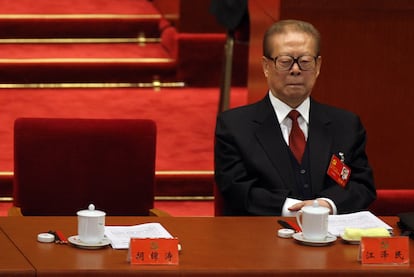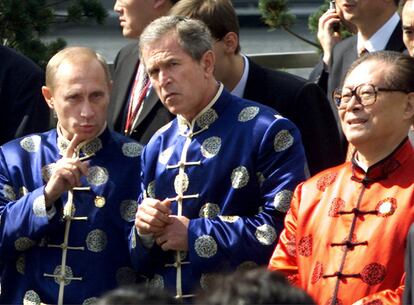Former Chinese president Jiang Zemin, architect of ‘socialist market economy,’ dies at 96
The Communist Party leader helmed the country’s 1990s economic boom and oversaw the handover of Hong Kong and accession to the World Trade Organization


Former Chinese president Jiang Zemin died on Wednesday at the age of 96 due to leukemia and multi-organ failure, the official state news agency Xinhua confirmed. Jiang served as general secretary of the Chinese Communist Party (CCP) from 1989 to 2002 and as president of China from 1993 to 2003, during which he continued the policies of economic reform and the opening-up of the country initiated by Deng Xiaoping.
Jiang came to power as a compromise between factions after the 1989 Tiananmen student protests, which ended in a brutal crackdown that resulted in the deaths of hundreds or perhaps thousands of protesters. He was seen as the person best capable of balancing Deng’s open-minded policies with the continued stability and control of the party.
He was also appointed chairman of the Central Military Commission in 1989 and would later be elected China’s president 1993. However, he did not effectively consolidate his position at the apex of China’s power pyramid until the death in 1997 of Deng, whose figure still cast a long political shadow.
Jiang’s presidency laid the foundations for China’s rise to superpower status, on the back of full-throttle economic growth and having forged the image of a global, accessible and business-friendly giant. In 1997, he oversaw the British handover of Hong Kong, a symbolic end to what many in China call “the century of humiliation.” Macau also returned to the Chinese fold from Portuguese rule in 1999 and Jiang’s policy of openness reached its zenith in 2001 with China’s accession to the World Trade Organization, the culmination of Jiang’s “socialist market economy,” and the selection of Beijing as host city for the 2008 Olympic Games.
Jiang stood down from his position at the head of the CCP in 2002 and vacated the presidency in 2003, adhering to the written and unwritten principles of the party that governed the renewal of the top leadership positions after a maximum of two five-year mandates. These rules were recently overturned by current Chinese President Xi Jinping, who pushed through a constitutional change in 2018 allowing him to be re-elected as general secretary for a third term at the 20th National Congress of the Chinese Communist Party held last October.
A Chinese Communist Party statement announced the news of Jiang’s death to its more than 97 million members, expressing “deep sorrow” over the former president’s passing. “Comrade Jiang Zemin was an exceptional leader of high repute among the Party, the Army and all Chinese ethnic groups,” the statement read, describing him as “a great Marxist, a great proletarian revolutionary, statesman, military strategist and diplomat,” who led China on to the path of “the great cause of socialism with Chinese characteristics.”

During Jiang’s years in power, the foundations were laid for what many analysts consider an unwritten social contract between the Communist Party and the population, whereby a large part of the Chinese citizenry exchange many of their freedoms and entrusted control to the single-party system in exchange for benefiting from the country’s meteoric economic development. The boom of the 1990s and the early 2000s, which some nostalgics refer to as China’s “golden years” has however slowed in the last decade, coinciding with Xi’s rise to the position of absolute leader.
Beyond policy making, Jiang remains something of an anomaly in Chinese politics. An electrical engineer, he was passionate about classical music, an avid reader of poetry and an amateur pianist. He was also incredibly charismatic, taking center stage in ways that would be unthinkable among China’s political elite today, such as dancing with the wife of former French president Jacques Chirac, appearing on legendary US talk show 60 minutes or performing an impromptu rendition of O sole mio with Luciano Pavarotti when the Three Tenors were performing in Beijing. That same year, he capped a tour of Latin America by singing a duet with Julio Iglesias in the presence of then-Venezuelan president Hugo Chávez.
Sign up for our weekly newsletter to get more English-language news coverage from EL PAÍS USA Edition
Tu suscripción se está usando en otro dispositivo
¿Quieres añadir otro usuario a tu suscripción?
Si continúas leyendo en este dispositivo, no se podrá leer en el otro.
FlechaTu suscripción se está usando en otro dispositivo y solo puedes acceder a EL PAÍS desde un dispositivo a la vez.
Si quieres compartir tu cuenta, cambia tu suscripción a la modalidad Premium, así podrás añadir otro usuario. Cada uno accederá con su propia cuenta de email, lo que os permitirá personalizar vuestra experiencia en EL PAÍS.
¿Tienes una suscripción de empresa? Accede aquí para contratar más cuentas.
En el caso de no saber quién está usando tu cuenta, te recomendamos cambiar tu contraseña aquí.
Si decides continuar compartiendo tu cuenta, este mensaje se mostrará en tu dispositivo y en el de la otra persona que está usando tu cuenta de forma indefinida, afectando a tu experiencia de lectura. Puedes consultar aquí los términos y condiciones de la suscripción digital.








































